“My great uncle — my grandfather’s brother — fought in World War I and came back from that war diagnosed as having shell shock, which is what we call (post-traumatic stress disorder) these days,” said McGowan, who works in the Department of English and Comparative Literature. “And he actually spent the rest of his life, which was almost another 50 years, in a veteran’s hospital,”
The University will honor stories like this one with the World War I Centenary Project, a year-long conversation on the cause, impact and legacy of the Great War.
“ My grandfather, (my great-uncle’s brother), was deaf in one ear because of a childhood illness, and so they wouldn’t let him sign up,” he said. “So I’m probably here because my grandfather was deaf and did not have his brother’s experience as a soldier in World War I.”
“Dolly Wilde’s Picture Show,” which premiered Thursday in Swain Hall, is the first event that will remind students of the past and the lasting impact of the first global war.
It will show again today at 8 p.m.
Playwright Rebecca Nesvet tells the story of Oscar Wilde’s supposedly identical niece, one of the war’s first female ambulance drivers.
She said students need to understand the first modern war and learn from the artists who have divulged its secrets.
“We need — as Dolly Wilde proposes in my play — a ‘talking cure’ for war and for the breakdowns of communication and empathy that often fuel conflict,” she said in an email.



